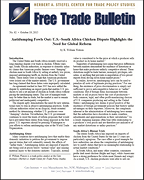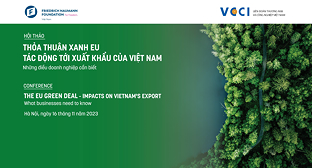Antidumping Fowls Out: U.S.–South Africa Chicken Dispute Highlights the Need for Global Reform
20/10/2015 12:00

Introduction
The United States and South Africa recently resolved a long-standing dispute over trade in chicken. Fifteen years ago, South African authorities, in response to domestic indus- try claims that American poultry farmers were “dumping” chicken meat in South Africa by selling at unfairly low prices, imposed antidumping tariffs on chicken from the United States. These duties were so high that American producers were locked out of the market entirely. The U.S. government has long claimed that those duties were improperly calculated. An agreement reached in June 2015 has now settled the dispute by establishing an import quota that enables U.S. pro- ducers to sell a set amount of chicken in South Africa without paying the antidumping duties. This sort of managed trade may be better than no trade, but the market is sure to remain politicized and inadequately competitive. The dispute aptly demonstrates the need for new interna- tional rules to rein in abusive antidumping practices. South African authorities relied on an illogical, result-oriented method for determining whether U.S. producers were “dumping” chicken. Nevertheless, the U.S. government continues to resist the kinds of reform proposals that would have prevented these duties from being imposed in the first place. U.S. exporters should be pressing Washington to join efforts to reform antidumping rules at the World Trade Organization.
by K. William Watson
Source: K. William Watson, Free Trade Bulletin, Herbert A. Stiefel Center for Trade Policy Studies, No. 62, October 19, 2015.
by K. William Watson
Source: K. William Watson, Free Trade Bulletin, Herbert A. Stiefel Center for Trade Policy Studies, No. 62, October 19, 2015.
| Tải tài liệu | |
|---|---|
| antidumping-fowls-out | |
Các tin khác
- The Dispute Settlement Crisis in the World Trade Organization: Causes and Cures (16/03/2018)
- Modification of trade defence rules regarding non-market economy costs and prices (23/02/2018)
- Research Paper: Options for Disciplining the Use of Trade Remedies in Clean Energy Technologies (03/08/2017)
- Addressing the rise of Trade Remedies against Environmental Goods (03/08/2017)
- Anti-dumping Retaliation - —A Common Threat to International Trade (15/11/2016)
 Home
Home
 About Us
About Us




















